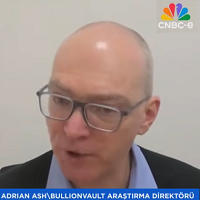Depression Economics
Revisiting the Great Depression with Murray Rothbard...
SOMETIMES, albeit very occasionally, you come across a book that utterly changes the way you look at the world, writes Tim Price at Price Value Partners.
One such book: Murray Rothbard's extraordinarily thought-provoking "America's Great Depression" (The Ludwig von Mises Institute, Fifth Edition, 2008).
Rothbard, who died in January 1995, was something of a 'Renaissance man': scholar, economist, historian and philosopher. He was also a leading member of what has come to be known as the Austrian school of economics – which amongst other things maintains a healthy cynicism about the value of mathematical modelling in markets, and which puts a premium on 'sound money' over more speculative and ultimately dangerous credit creation.
Not least in its suspicion of the role of banks, it is the perfect read for our time.
If your schooling was anything like ours, "America's Great Depression" will turn on its head your opinion of the economic catastrophe of the 1930s – a period whose echoes resound throughout the global financial crisis that began in 2007 and which has yet to be resolved, if the share prices of the major US banks, for example, are any guide.
In essence, the message we received at school was that Herbert Hoover oversaw a stupendous Crash in the US stock market; the economy entered a profound slump; and it was only the interventionist vigour of President Franklin D. Roosevelt which pulled it back out.
But Rothbard's conclusions are diametrically opposed. President Hoover, by Rothbard's account, threw all kinds of government resources at the problem, long before Roosevelt's own alphabet soup of state agencies. Rothbard's thoughts about the banking system, in particular, and about the role of government in addressing booms and busts, have enormous relevance for today's investment markets.
Rothbard's death in 1995 meant that he was unable to share with us his views about the orgy of credit provision and the unrestrained mortgage lending that in large part triggered the global banking crisis. Let's not even mention the economic insanity that accompanied Covid, most notoriously lockdowns. But it is unlikely that he would have approved. And he had extremely strong opinions about the very nature of fractional reserve banking: the system by which banks keep a tiny fraction of their deposits in order to lend out the remainder for profit. As he comments in this masterful work:
"Banks are "inherently bankrupt" because they issue far more warehouse receipts to cash (nowadays in the form of "deposits" redeemable in cash on demand) than they have cash available. Hence, they are always vulnerable to bank runs. These runs are not like any other business failures, because they simply consist of depositors claiming their own rightful property, which the banks do not have. "Inherent bankruptcy," then, is an essential feature of any fractional reserve banking system."
Rothbard goes on to quote Frank D. Graham from "Partial Reserve Money and the 100% Proposal" (American Economic Review, September 1936):
"The attempt of the banks to realize the inconsistent aims of lending cash, or merely multiplied claims to cash, and still to represent that cash is available on demand is even more preposterous than.. eating one's cake and counting on it for future consumption.. The alleged convertibility is a delusion dependent upon the right's not being unduly exercised."
Suffice to say that Rothbard, and members of the Austrian school, hold to the primacy of gold as a fundamental store of value that restricts the animal spirits of bankers to indulge in uncontrolled credit creation.
As Rothbard sees it, the business cycle is straightforward. Bank credit expansion causes an inflationary boom, which is marked by an expansion in the money supply and by what he calls malinvestment, both by bankers and entrepreneurs. The crisis comes about when credit expansion halts abruptly and those malinvestments become all too evident. What he then calls the "depression recovery" starts the necessary adjustment process "by which the economy returns to the most efficient ways of satisfying consumer desires."
Note that Rothbard conjoins "depression" and "recovery": they are one and the same thing. You cannot have economic recovery without a cleansing depression:
"Wasteful projects.. must either be abandoned or used as best they can be. Inefficient firms, buoyed up by the artificial boom, must be liquidated or have their debts scaled down or be turned over to their creditors. Prices of producers' goods must fall, particularly in the higher orders of production – this includes capital goods, lands, and wage rates.. Not only prices of particular machines must fall, but also the prices of whole aggregates of capital, e.g. stock market and real estate values. In fact, these values must fall more than the earnings from the assets.."
"Liquidate labour, liquidate stocks, liquidate the farmers, liquidate real estate." This notorious quote from US Treasury Andrew Mellon after the Crash once struck us as grotesque, unfeeling, and overly simplistic. Now, having read Rothbard, we are not so sure. Mellon suggested that the economic severity of the depression would "purge the rottenness out of the system."
This sounds like painful medicine, which of course it is. But as the scale of government support for the banking system in our own time continues to swell monstrously, one might well ask whether the presumed interventionist cure is worse than the disease. Rothbard, as a classic free marketeer, indicates that the economic contraction process causes no positive malinvestments (unlike the boom that preceded it), so it will not lead to such a painful period of depression and adjustment. "If businessmen are misled into thinking that less capital is available for investment than is really the case, no lasting damage in the form of wasted investments will ensue."
Where the Rothbard thesis is most striking, however, is in relation to the role of government. His first and clearest injunction to return the economy to "normal" prosperity: don't interfere with the market's adjustment process;
"The more the government intervenes to delay the market's adjustment, the longer and more gruelling the depression will be, and the more difficult will be the road to complete recovery. Government hampering aggravates and perpetuates the depression. Yet, government depression policy has always (and would have even more today) aggravated the very evils it has loudly tried to cure."
Rothbard goes on to list the various ways that government might hamper this market adjustment process. Ironically, the list also and exactly constitutes the preferred "anti-depression" measures of government policy! The list of flawed palliatives runs as follows:
- Prevent or delay liquidation. Lend money to shaky businesses, call on banks to lend further, etc.
- Inflate further. Further inflation blocks the necessary fall in prices, thus delaying adjustment and prolonging depression.
- Keep wage rates up. Artificial maintenance of wage rates in a depression ensures permanent mass unemployment.
- Keep prices up. Keeping prices above their free market levels will create unsaleable surpluses, and prevent a return to prosperity.
- Stimulate consumption and discourage saving. Any increase in the relative size of government in the economy shifts the societal consumption-investment ratio in favour of consumption, and prolongs the depression.
- Subsidize unemployment. Any subsidisation of unemployment will prolong unemployment indefinitely, and delay the shift of workers to the fields where jobs are available.
What is striking today is how many of these measures are being actively pursued by the governments of developed economies, not least our own.
Rothbard concludes his study of the Great Depression by pointing out just how extensive the Hoover administration measures were in an ultimately vain attempt to combat the slump.
"For the first time, laissez-faire was boldly thrown overboard and every governmental weapon thrown into the breach.. By every "progressive" tenet of our day, he should have ended his term a conquering hero; instead he left America in utter and complete ruin – a ruin unprecedented in length and intensity."
Why did this come about? Rothbard holds, perhaps controversially, that only governmental inflation can generate a true boom and bust cycle, and that any depression will be prolonged and intensified by inflationist intervention on the part of presumably well-meaning politicians. "America's Great Depression" showcases Rothbard's firm belief that President Hoover's aggressive interventionist measures ended up aggravating the economic slowdown. In his words,
"The guilt for the Great Depression must, at long last, be lifted from the shoulders of the free-market economy, and placed where it properly belongs: at the doors of politicians, bureaucrats and the mass of "enlightened" economists. And in any other depression, past or future, the story will be the same."
Governments and their central banks, in other words, are the primary causes of recessions and depressions – and of wild inflations. Unsound fiat must ultimately be replaced by sound money. The prices of gold and silver would now appear to be reaching exactly the same conclusion.









 Email us
Email us